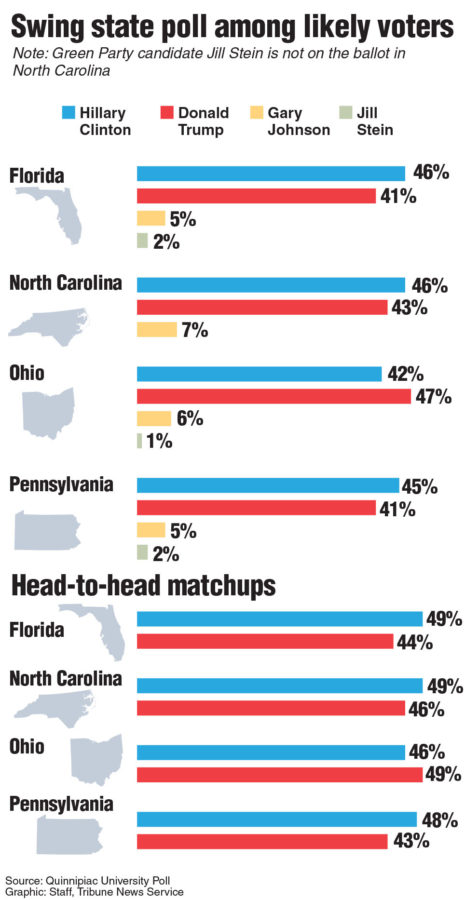Don’t let polls fuel voter apathy
Columnist Hawley warns against placing too much stake in polls. This poll, from Oct. 4, shows a close race between Hillary Clinton and Donald Trump
Oct 10, 2016
Too much is made out of polls and projections regarding elections and political decisions. People see polls and statistics for what analysts believe will happen, but relying on this data can often be subversive to political participation.
Polls can be helpful measuring tools, but depending on those projections can cause voters to rely on other people to fulfill those projections. Because of this, young voters must be aware and overcome the temptation of staying home because of what polls say about the future of a given election.
Evidence of this particular phenomenon is evident in several key votes abroad.
Perhaps the best example comes from a recent vote in Colombia to end a 52-year war between the government and rebels. Polls projected the peace agreement to pass and it looked as though Colombia would finally feel a sense of hope and progress. Colombian polls and popular opinion made it seem like a certainty that the peace would pass, making the defeat even more painful to bear.
The reported turnout was extremely low in Colombia, hovering around 38 percent, and it might speak to why the vote failed.
Colombians may have felt that passing the peace was inevitable, and participating might have been an unnecessary and laborious activity. The result was a slight margin for a defeat, and serves the point that polls are not the only basis for predicting political outcomes.
With that said, we cannot allow ourselves to fall into a similar trap. Doing so would be unrepresentative and would allow for no recourse to correct a potentially disastrous result.
This is particularly important given the latest development in the ever-perplexing Trump saga. Trump’s comments in 2005 about women will most likely push more polls in favor of Hillary Clinton as November draws near.
Poor performances in the remaining debates could cause Trump’s stock to fall even lower and it might prompt some potential Clinton supporters to stay at home.
The more ridiculous and far-fetched a Trump victory becomes, the more important it is that voter turnout is high. Some might feel as though a Clinton presidency is the only logical choice and American voters will do their work for the rest of the population.
But it is exactly this thinking that doomed Colombia to uncertainty and despair. If American voters get complacent from what popular opinion and polls suggest, the results could leave voter turnout low and Donald Trump in the Oval Office.
Professors and activists will be hounding students to register and vote come election season, and some (including myself) get tired of constantly being pressured to show up to vote. Many students might feel that one vote can hardly make or break the election. But this kind of defeatist, apathetic approach is what leads to backward and unpopular results.
It is with that in mind that I urge young voters to show up to vote. Though the constant badgering might be annoying, it is necessary to ensure the greatest participation so that the elections give the people what they really want. Many students won’t vote. They have busy lives, plans and many responsibilities. Voting might not be at the top of to-do lists. But it shouldn’t be shoved to the side and forgotten, else we find ourselves complaining about a process we didn’t bother caring about until it’s too late.








